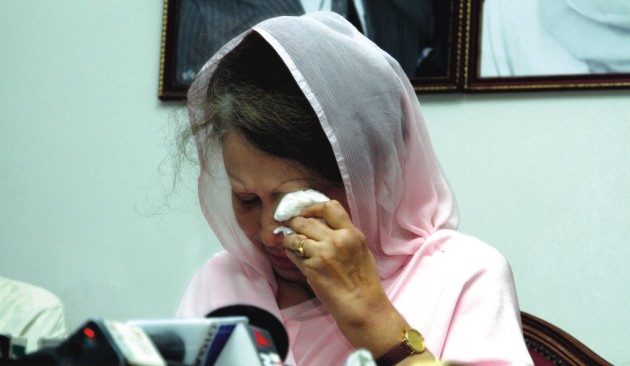| Politics
There is no Place like Home
Calling hartal is bad as it is, calling it for petty personal
reason is even worse
AHMEDE HUSSAIN

Photo: AMRAN HOSSAIN
To begin with, even though we live in a free state, in a country as densely populated as Bangladesh, it is morally wrong for Khaleda Zia, who claims herself to be the leader of the people, to live in a house, all for herself, on a 2.72-acres of land. The establishment, which has shot to notoriety in Bangladesh's politics as Khaleda's cantonment house for she owns another 1.3-bigha house in the city's fashionable Gulshan area, came as a gift from Lt Gen HM Ershad, who declared himself President a few months after Ziaur Rahman, Khaleda's husband, was brutally murdered in Chittagong.
Time, however, has made a politician out of Zia's shy widow, who a few years after her husband's death entered politics and led a mass upsurge that had witnessed the collapse of Ershad's vile and despotic rule. Since then, Khaleda had been elected Prime Minister thrice, twice in popular vote, once in a joke of an election where the subsequent parliament breathed its last four months after the polls. Khaleda, meanwhile, had stayed in her Shaheed Mainul Road house, and even though the law does not allow a resident of the cantonment to lead a democratic political party from the barracks, Khaleda has flouted it the most brazenly.
The issue raised its head in her last regime when Khaleda's government scrapped a law made by the previous government that provided life-long security to Bangabandhu Sheikh Mujibur Rahman's two surviving daughters. Khaleda also cancelled the allotment of Gonobhaban, the official residence of the Prime Minister, to Sheikh Hasina and Sheikh Rehana. Faced with criticisms, Khaleda did what she does best: she remained silent. So, even though, her two sons later became stakeholders in passenger-launches and a textile industry, Khaleda clung onto her cantonment house, a gift from the government to Zia's widow and two orphans.
A letter was issued to Khaleda, cancelling the allotment of the house, after the Awami League-led Grand Alliance came to power in 2008. She went to the High Court (HC), the court turned down her plea and Khaleda's counsels did not move the stay petition against the HC verdict to the Appellate Division. The HC gave Khaleda 30 days to vacate the house and it expired on the 13th of this month. The following day, even though Khaleda's appeal is still pending with the Appellate Division, the government sent the police, along with the Rapid Action Battalion members and threw her out.
The mad rush with which the government went whole hog to evict Khaleda and the latter's emotion-soaked press conference at which she cried gave the BNP an added leverage. There were neatly packed packages in the house though, signs that Khaleda and her staffs had prepared long and hard enough to move to a new establishment.
That the eviction was done two days before Eid, one of the largest festivals in the calendar of the ordinary Bangladeshis swung people's sympathies towards Khaleda. But she ruined it thoroughly so within hours. The hartal that the BNP called, only two days before Eid, brought only misery and untold sufferings for the millions who were leaving Dhaka to spend Eid with their loved ones.
To make matters worse, the house issue is seen by ordinary Bangladeshis as a petty personal affair as their lives are plagued with many problems, some of which stem from the sheer failure of the present government. A few months ago, the BNP leadership provided mere lip service when different student factions allegedly belonging to AL-backed Chhatra League took up arms at different dormitories and educational institutions over control of government-run tenders and the supremacy of halls.
The market for essentials has remained as volatile as ever and the BNP has never raised the issue in the parliament. In fact, as an opposition, the BNP has remained as directionless as ever. It is not because it does not garner enough support in the parliament: the party leadership, on the contrary, has been boycotting the house for a long time, giving a free reign to the ruling alliance over the proceedings of the parliament.
Hartal is a legitimate and democratic expression in politics. Bangladeshis are no strangers to it: from the anti-Ayub mass upsurge to the struggle for democracy in 1990, hartal has always been the people's will and desire expressed in the streets. But hartal is also the last resort in politics; it is called in when a leader has exhausted even the last weapon she has at her disposal.
The November 15 hartal was unnecessarily called and it was harmful for the people. There is no denying that the government's action was uncivil, and the cavalier manner in which the issue has been handled-- especially when the matter is pending with the highest court of the land--is deplorable. But equally unacceptable perhaps is the BNP's reaction to the incident: the party leadership is acting as vacillating as a babe in the wood. It is high time that the BNP went back to the parliament and raised its voice on the floor on important issues that the country is now facing.
Khaleda's house is a legal matter; both the ruling and the opposition parties should not have dragged it into the streets. Bangladesh's politics is littered with squabbling politicians who can do anything and everything that they can to cling on to power. The painful events in the run up to 1/11 has taught us that the politics of violence and vengeance never bodes well for democracy. It seems our politicians have not learned the lessons that history has so painstakingly taught them.
Copyright
(R) thedailystar.net 2010 |
